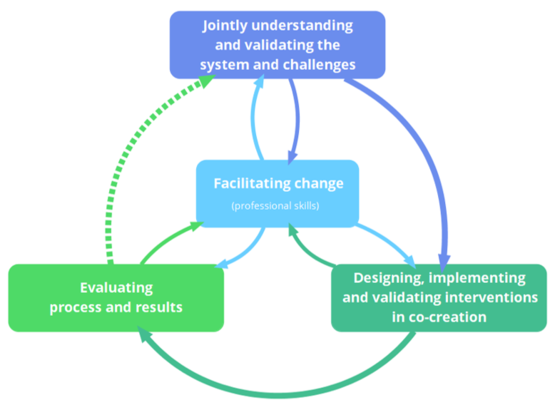LC 00140: verschil tussen versies
Geen bewerkingssamenvatting |
Geen bewerkingssamenvatting |
||
| (15 tussenliggende versies door dezelfde gebruiker niet weergegeven) | |||
| Regel 1: | Regel 1: | ||
== Definition and requirements == | |||
=== Definition === | |||
A Living Lab is a concrete user-centered, open-innovation and research setting in which stakeholders with different backgrounds, interests, views and expertise interdisciplinary and through dialogue continuously collaborate and jointly learn (they co-create, or even "co-evolve") to create movement and adaptively find desired and sustainable improvements for complex, social challenges. | A Living Lab is a concrete user-centered, open-innovation and research setting in which stakeholders with different backgrounds, interests, views and expertise interdisciplinary and through dialogue continuously collaborate and jointly learn (they co-create, or even "co-evolve") to create movement and adaptively find desired and sustainable improvements for complex, social challenges. | ||
=== Requirements of working and learning in Living Labs === | |||
There is a program of societal challenges (e.g. a research program) that is being worked on in Living Labs. These challenges are of a complex nature involving many different stakeholders (perspectives) for which interactive learning and social innovation is required. What is needed here is a change process, broad dialogue and developing skills of the stakeholders involved. In a Living Lab stakeholders approach the challenge from a systems thinking perspective (see figure 1). They can try to understand what is at stake, they can formulate a shared goal to improve the challenging situation, they can and determine the boundaries of the Living Lab: what is and is not included in it, and why? Stakeholders can reflect critically on the content and process of the challenge itself, the "group learning" process and the individual role. This leads to validated awareness of the challenge. | |||
In a Living Lab stakeholders | In a Living Lab stakeholders can jointly and continuously search for widely supported and sustainable improvements, in which the stakeholders take both their joint and individual responsibilities and play their own, specific roles. This leads to trust and connection. | ||
In a Living Lab | In a Living Lab there is no such construction of client-contractor. Students are future Facilitators of Change - our future colleagues. They can take their role in the form of master-apprentice. | ||
Lessons learned are shared, and ideally are added to a Body of Knowledge and Skills[[Bestand:Facilitating change visual EN.png|gecentreerd|miniatuur|550x550px|'''Figure 1:''' The process of guiding socially desirable changes.|koppeling=https://projectenportfolio.nl/wiki/index.php/Bestand:Facilitating_change_visual_EN.png]] | |||
==Further reading== | |||
*European Network of Living Labs: {{External link|resource=Resource Hyperlink 00339|name=ENoLL|dialog=process-linkwebsite-dialog}} | *European Network of Living Labs: {{External link|resource=Resource Hyperlink 00339|name=ENoLL|dialog=process-linkwebsite-dialog}} | ||
*{{Cite|resource=Bestand:Rik Eweg.Intercultureel werken in Living Labs.pdf|name=Intercultureel werken in Living Labs|dialog=process-file-dialog}} | *{{Cite|resource=Bestand:Rik Eweg.Intercultureel werken in Living Labs.pdf|name=Intercultureel werken in Living Labs|dialog=process-file-dialog}} | ||
*{{Cite|resource=Bestand:Hanze hogeschool - Handreiking innovatiewerkplaatsen 21-1-2016.pdf|name=Handreiking innovatiewerkplaatsen|dialog=process-file-dialog}} | *{{Cite|resource=Bestand:Hanze hogeschool - Handreiking innovatiewerkplaatsen 21-1-2016.pdf|name=Handreiking innovatiewerkplaatsen|dialog=process-file-dialog}} | ||
*{{Cite|resource=Bestand:Co-creatie in Living Labs v 20150921.docx|name=Co-creation in living labs|dialog=process-file-dialog}} (article, in Dutch) | *{{Cite|resource=Bestand:Co-creatie in Living Labs v 20150921.docx|name=Co-creation in living labs|dialog=process-file-dialog}} (article, in Dutch) | ||
{{Light Context | {{Light Context | ||
|Supercontext=LC_00484 | |Supercontext=LC_00484 | ||
| Regel 61: | Regel 24: | ||
|Toppage=Other | |Toppage=Other | ||
|Sequence number=300000 | |Sequence number=300000 | ||
|Sequence numbers=; | |Sequence numbers=undefined,undefined; | ||
|Context type=Situation | |Context type=Situation | ||
|Heading= | |Heading=About Living Labs | ||
|Show referred by=Nee | |Show referred by=Nee | ||
|Show edit button=Ja | |Show edit button=Ja | ||
|Show VE button=Ja | |Show VE button=Ja | ||
|Show title=Ja | |Show title=Ja | ||
}} | }} | ||
Huidige versie van 12 jan 2022 om 11:47
Definition and requirements
Definition
A Living Lab is a concrete user-centered, open-innovation and research setting in which stakeholders with different backgrounds, interests, views and expertise interdisciplinary and through dialogue continuously collaborate and jointly learn (they co-create, or even "co-evolve") to create movement and adaptively find desired and sustainable improvements for complex, social challenges.
Requirements of working and learning in Living Labs
There is a program of societal challenges (e.g. a research program) that is being worked on in Living Labs. These challenges are of a complex nature involving many different stakeholders (perspectives) for which interactive learning and social innovation is required. What is needed here is a change process, broad dialogue and developing skills of the stakeholders involved. In a Living Lab stakeholders approach the challenge from a systems thinking perspective (see figure 1). They can try to understand what is at stake, they can formulate a shared goal to improve the challenging situation, they can and determine the boundaries of the Living Lab: what is and is not included in it, and why? Stakeholders can reflect critically on the content and process of the challenge itself, the "group learning" process and the individual role. This leads to validated awareness of the challenge.
In a Living Lab stakeholders can jointly and continuously search for widely supported and sustainable improvements, in which the stakeholders take both their joint and individual responsibilities and play their own, specific roles. This leads to trust and connection.
In a Living Lab there is no such construction of client-contractor. Students are future Facilitators of Change - our future colleagues. They can take their role in the form of master-apprentice.
Lessons learned are shared, and ideally are added to a Body of Knowledge and Skills
Further reading
- European Network of Living Labs: ENoLL
- Intercultureel werken in Living Labs
- Handreiking innovatiewerkplaatsen
- Co-creation in living labs (article, in Dutch)

